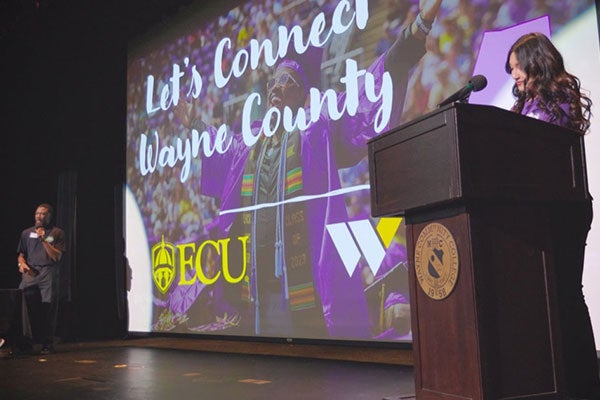Let’s Connect connects rural students to higher education information
ECU and Wayne Community College co-hosted Let’s Connect for middle and high school students.
Assistant principal Randy Meisenhelder looked over the crowd of about 60 Spring Creek High School students gathered to hear about opportunities to further their education. “My kids have to go,” said East Carolina University alumnus (’09) Meisenhelder. “We have to do what we can to get them there.” Meisenhelder recalls his reaction when he first heard about Let’s Connect Wayne County. Let’s Connect is a pilot program through which ECU students, faculty and staff partner with local community colleges to present an in-person college knowledge program and college fair for middle school through community college students and their families. Let’s Connect Wayne County was held at Wayne Community College (WCC) on Nov. 16.
Spring Creek High School transported its students on two school buses for the inaugural event. Let’s Connect is held in the evenings from 6-8 p.m. To make their Let’s Connect experience a memorable one, Meisenhelder and other Spring Creek school leaders had their students stay after school. They had a pizza party and watched a movie before heading to WCC. The basis for Let’s Connect is to meet students and their families where they are and connect them with as much information as they need to make an informed decision about higher education.
“Some of them have never even had the expectation themselves that they would be able to go to a university. … So, for some of them, it does feel unreachable,” Meisenhelder said.
Over 20 different programs and groups from ECU and about 15 from WCC participated in the event. The programs and representatives filled up the lobby of the college’s Wayne Learning Center. Similar programs from both schools were placed beside each other. This allowed for the opportunity to show prospective students the different pathways that could benefit them – especially through established transfer programs between the two institutions.

Current Wayne Community College and future ECU student Caleb Mitchell, left, and ECU junior Sariah Ortiz co-host a college knowledge presentation at Wayne Community College as part of ECU’s new Let’s Connect event.
“Wayne Community College values our university partners such as East Carolina University and events such as Let’s Connect,” said Dr. Brandon Jenkins, WCC vice president of academic and student services. “Events such as these strengthen those partnerships while allowing our Wayne County middle and high school students the opportunity to explore career opportunities and the education and credentials needed to reach those goals.”
Not only were the students and their families able to explore the different programs, but they also had one-on-one time for questions. There were two breakout sessions: one on “next steps” for underclassmen to position themselves now for higher education in the future and a question-and-answer session in Spanish. The session in Spanish was to ensure information about the college process was understood and that nothing was lost in translation.
“I know the power of someone speaking hope of a brighter future into my life, as well as the opportunities higher education can have on obtaining pathways to achieving that future,” said ECU’s Alana Freeman, a teaching instructor and program co-coordinator for family and consumer sciences.
According to the U.S. Census Bureau, the median household income in Wayne County is $49,499 – which is $11,000 less than the state average. Census data also shows only one in five Wayne County residents, aged 25 and older, has a bachelor’s degree or higher. To put things into perspective, the U.S. Bureau of Labor Statistics shows the more education one has, the higher – on average – their salary is. So, on average, for someone with just a high school diploma will make $44,356 a year compared to $52,260 for someone with an associate degree, $74,464 for someone with a bachelor’s degree, $86,372 with a master’s degree and $108,316 for someone with a doctorate. These stats were part of the presentation.
“Let’s Connect is transformational! It provides hope, guidance and resources to middle and high school students across rural North Carolina,” said Dr. Mary Huffman, assistant professor in ECU’s College of Education. “Let’s Connect takes down the barriers placed in front of low socioeconomic students by bringing experts in scholarships, student loans, the college application process and each of the colleges at ECU.”
Next up is Let’s Connect Duplin County at James Sprunt Community College on Nov. 30. In the new year, Let’s Connect will take place at Sampson Community College on Feb. 15; at Pitt Community College on Feb. 29; and at Lenoir Community College (serving Lenoir, Jones and Greene counties) on March 14.
“The vision for helping the community remains the focus of Let’s Connect,” Freeman said.
ECU’s new strategic plan – Future focused. Innovation driven. – has student success and regional transformation within its mission priorities and social and economic mobility within its vision priorities. Let’s Connect was created within that mindset – to reach rural students who might otherwise fall through the cracks and show the various pathways students can use to earn their degrees. While it might take months or even years to see Let’s Connect’s impact on rural North Carolina communities, there was one immediate reaction to the event from the stakeholders it was made for.
“Our kids had a blast,” Meisenhelder said.